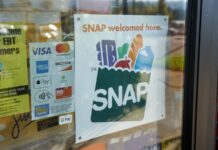Plastic pollution: it seems to be taking over our oceans and beaches. An estimated 8 million tons of plastic ends up in our oceans every year, a number that has skyrocketed over the last 70 years as our demand for plastic has grown. Therefore it seems like it was only a matter of time before plastic pollution evolved into something even worse.
Researchers have discovered a new, maybe even more permanent, form of plastic pollution. Dubbed ‘plasticrust’, this type of pollution incorporates itself right into the rocky shoreline of the Portuguese island of Madeira.
In 2016 marine ecologist Ignacio Gestoso noticed that strange crusts were forming on the volcanic shoreline rocks of the island. Light blue films were incorporated onto the rocks. Samples and photos were taken and it was assumed that the phenomenon was a one-off.
Then the next year researchers returned to find the crusts still there. A year later again they returned to find that not only was the ‘plasticrust‘ still there but it had grown, spreading out over a larger area and now in multiple colors.
After observing and randomly sampling rocky areas of the shoreline, researchers determined that over the three year period the plasticrust had grown from a single area to cover almost 10 percent of the rocks’ surfaces.
Samples taken from the rocks revealed that the plasticrust was polyethylene, a common plastic substance used in single-use packaging and food containers.
The research team published their findings this month in the journal of Science of the Total Environment. “[The crusts] likely originated by the crash of large pieces of plastic against the rocky shore, resulting in plastic crusting the rock in a similar way algae or lichens do,” Gestoso told Earther.
It is not yet known how the plasticrust will affect the ecosystem on the island. Many intertidal animals stick to these shoreline rocks and feed from the algae that normally grows on them. After observing the winkle sea snail on the plasticrust surfaces, Gestoso’s team found that the snails didn’t avoid the plasticrust surfaces, meaning they could be eating algae that settles on top of the plastic pollution and therefore may be ingesting some of the plastic in the process.
Although the phenomena os plasticrust is a never-before-seen form of plastic pollution, there has been a similar new type of new plastic pollution found before. Six years ago researchers found a merger of plastic and rock in Hawaii. This new phenomenon was dubbed ‘plastiglomerate’ and was the result of campfires melting plastic waste and bonding it with sand and pebbles.
Plastics break down when exposed to the sun, breaking down to millions of smaller pieces, known as microplastics. Plastic breaks down into such small segments that pieces of plastic from a one liter bottle could end up on every mile of beach throughout the world.
Plastic pollution in our oceans is such a pervasive and growing problem that it is likely ocean plastic will outweigh fish by 2050.





















COMMENTS